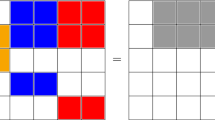Abstract
In game theory, an action is said to be weakly dominated if there exists another action of the same player that, with respect to what the other players do, is never worse and sometimes strictly better. We investigate the computational complexity of the process of iteratively eliminating weakly dominated actions (IWD) in two-player constant-sum games, i.e., games in which the interests of both players are diametrically opposed. It turns out that deciding whether an action is eliminable via IWD is feasible in polynomial time whereas deciding whether a given subgame is reachable via IWD is NP-complete. The latter result is quite surprising, as we are not aware of other natural computational problems that are intractable in constant-sum normal-form games. Furthermore, we slightly improve on a result of V. Conitzer and T. Sandholm by showing that typical problems associated with IWD in win-lose games with at most one winner are NP-complete.
Similar content being viewed by others
References
Apt, K.R.: Uniform proofs of order independence for various strategy elimination procedures. Contrib. Theor. Econ. 4(1) (2004)
Bernheim, B.: Rationalizable strategic behavior. Econometrica 52(4), 1007–1028 (1984)
Brandenburger, A., Friedenberg, A., Keisler, H.J.: Admissibility in games. Econometrica 76(2), 307–352 (2008)
Brandt, F., Brill, M., Fischer, F., Harrenstein, P., Hoffmann, J.: Computing Shapley’s saddles, ACM SIGecom Exchanges 8(2) (2009)
Brandt, F., Fischer, F., Harrenstein, P., Shoham, Y.: Ranking games Artif. Intell. 173(2), 221–239 (2009)
Conitzer, V., Sandholm, T.: Complexity of (iterated) dominance. In: Proceedings of the 6th ACM Conference on Electronic Commerce (ACM-EC), pp. 88–97. ACM Press, New York (2005)
Ewerhart, C.: Iterated weak dominance in strictly competitive games of perfect information. J. Econ. Theory 107, 474–482 (2002)
Gilboa, I., Kalai, E., Zemel, E.: The complexity of eliminating dominated strategies. Math. Oper. Res. 18(3), 553–565 (1993)
Kohlberg, E., Mertens, J.-F.: On the strategic stability of equilibria. Econometrica 54, 1003–1037 (1986)
Koller, D., Megiddo, N.: The complexity of two-person zero-sum games in extensive form. Games Econ. Behav. 4(4), 528–552 (1992)
Luce, R.D., Raiffa, H.: Games and Decisions: Introduction and Critical Survey. Wiley, New York (1957)
Marx, L.M., Swinkels, J.M.: Order independence for iterated weak dominance. Games Econ. Behav. 18, 219–245 (1997)
Myerson, R.B.: Game Theory: Analysis of Conflict. Harvard University Press, Cambridge (1991)
Osborne, M.: An Introduction to Game Theory. University Press, Oxford (2004)
Papadimitriou, C.H.: Computational Complexity. Addison-Wesley, Reading (1994)
Pearce, D.: Rationalizable strategic behavior and the problem of perfection. Econometrica 52(4), 1029–1050 (1984)
Samuelson, L.: Dominated strategies and common knowledge. Games Econ. Behav. 4, 284–313 (1992)
Shimoji, M.: On the equivalence of weak dominance and sequential best response. Games Econ. Behav. 48, 385–402 (2004)
Shoham, Y., Leyton-Brown, K.: Multiagent Systems: Algorithmic, Game-Theoretic, and Logical Foundations. Cambridge University Press, Cambridge (2009)
Author information
Authors and Affiliations
Corresponding author
Rights and permissions
About this article
Cite this article
Brandt, F., Brill, M., Fischer, F. et al. On the Complexity of Iterated Weak Dominance in Constant-Sum Games. Theory Comput Syst 49, 162–181 (2011). https://doi.org/10.1007/s00224-010-9282-7
Published:
Issue Date:
DOI: https://doi.org/10.1007/s00224-010-9282-7




